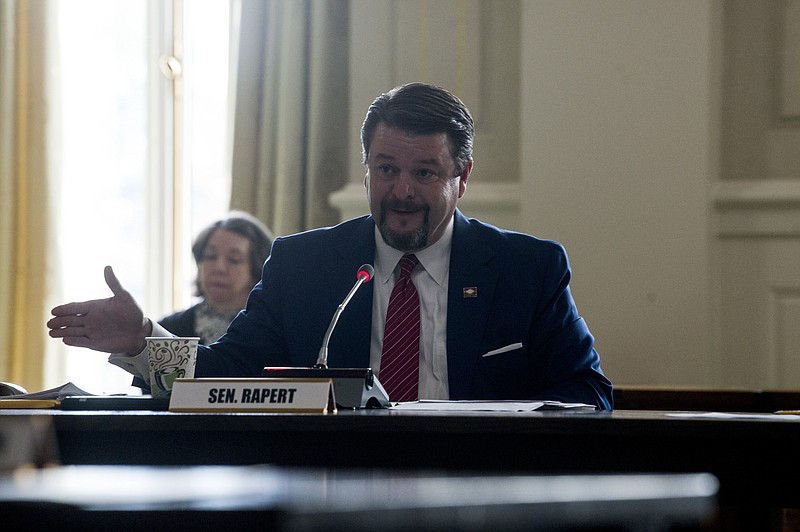The first day of Arkansas' second special legislative session of 2021 saw multiple unsuccessful attempts -- opposed by the governor -- to introduce a proposal creating a tax credit for law enforcement officers.
Gov. Asa Hutchinson convened the GOP-controlled Arkansas General Assembly into an extraordinary session that started Tuesday, calling on lawmakers to lower the top tax rate for individuals from 5.9% to 4.9% over the next four years and cut corporate taxes as well.
[Gallery not loading above? Click here for more photos » arkansasonline.com/128session/]
While Hutchinson has reiterated that he wants an efficient session focused on the tax cuts and some minor additional issues, several lawmakers have proposed other measures. Those include legislation to establish a $3,000 tax credit for full-time law enforcement officers from Sen. Jason Rapert, R-Conway.
A two-thirds vote is required in both chambers of the General Assembly to extend the session to consider legislation beyond what is listed in the governor's proclamation. Lawmakers must first complete the governor's business, which takes a minimum of three days. Other items could extend the session into next week, which is the week before Christmas.
Rapert filed two tax-related bills Tuesday: Senate Bill 9, which would establish the law enforcement tax credit, and Senate Bill 8, which includes the creation of a tax credit for law enforcement officers as well as the income tax cut that the governor put on the call for the special session.
On both bills, the Arkansas Senate voted to overturn Lt. Gov. Tim Griffin's rulings that they were germane to the governor's call. The chamber voted 23-9 to overturn Griffin's ruling on SB8 and 21-11 to overturn Griffin's ruling on SB9.
Later, Rapert proposed to amend adding the law enforcement tax credit to Senate Bill 1 by Sen. Jonathan Dismang, R-Searcy, the income tax bill agreed upon by the governor and legislative leaders. The Senate Revenue and Taxation Committee voted 4-2 to reject the amendment Tuesday afternoon.
Rapert told the committee that the amendment would cost the state only about $25 million a year more and he doesn't have a good excuse why the state can't afford it along with a tax-cut bill projected to eventually reduce revenue by about $500 million a year.
But Senate President Pro Tempore Jimmy Hickey, R-Texarkana, said it's a little disrespectful to the will of the Senate to present an amendment that mirrored a bill that the Senate ruled is not germane to the call for the special session.
Rapert said the Senate committee can do whatever it has the will to do.
Dismang said Rapert's amendment to his bill is "a hostile amendment" that he didn't learn about until the committee's meeting.
Rapert said his amendment "isn't hostile."
"This is a matter of political will," he said.
In a news conference held before the Legislature convened Tuesday morning, Rapert criticized Hutchinson for not including the law enforcement tax credit in the call and urged lawmakers to support it. He said Arkansas ranks 49th in the nation for average law enforcement officer pay.
"That's untenable and, frankly, embarrassing to me as a citizen of Arkansas," Rapert, who was joined by other lawmakers and dozens of law enforcement personnel, said.
Other supporters of the tax credit said it would help law enforcement personnel provide for their families and with agency recruitment.
Rapert said the tax credit was one of eight bills that the Back the Blue Legislative Caucus, which was formed earlier this year, proposed during the 2021 legislative session, and the only one to not pass. He also noted that a tax credit for active full-time law enforcement officers was among the recommendations from a task force Hutchinson assembled to review Arkansas' standards for police training and operations last year.
In his weekly news conference Tuesday afternoon, Hutchinson applauded the General Assembly for keeping the focus on the tax plan that morning. He said he supports increasing pay for law enforcement officers, which a tax credit would not do, and said it's hard to apply a tax credit only to law enforcement and not other first responders and front-line workers.
"The best policy is to lower the taxes for everyone and to work on increasing the salaries of law enforcement officials," Hutchinson said, adding that he had directed Arkansas Department of Public Safety director to work on a plan to increase Arkansas State Police salaries and look into ways to incentivize or encourage local governments to raise the salaries of their law enforcement officers.
He noted that the task force also recommended salary increases for law enforcement officers.
Hutchinson, a Republican, said he had talked with numerous House and Senate members who said they want to keep the session narrowly focused on tax cuts.
Also on Tuesday, Rapert filed Senate Bill 13, which adds a civil cause of action to a law passed earlier this year that bans all abortions except to save the life of a pregnant woman in a medical emergency. Act 309 of 2021 is enjoined by a court order.
The civil cause of action provision is similar to that included in the law Texas enacted in May that bans abortions at six weeks. Hutchinson said previously he did not place a Texas-style abortion law on the call for the special session because lawmakers should await guidance from the U.S. Supreme Court. There are cases pending before the nation's high court on the Texas law as well as a Mississippi abortion law.
Rapert has announced he will seek the Republican nomination for the lieutenant governor's office in 2022.
Gallery: Special Session Day 1
